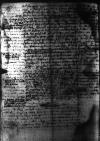Gratae nobis fuerunt tuae cf. Peter DEUTZSCHMANN to Ioannes DANTISCUS Graudenz (Grudziądz), 1547-02-26, CIDTC IDL 3051⌊cf. Peter DEUTZSCHMANN to Ioannes DANTISCUS Graudenz (Grudziądz), 1547-02-26, CIDTC IDL 3051⌋, ex quibus mentem tuam, quid de his tumultibus, qui nunc passim in Germany (Germania, Niemcy)⌊GermaniaGermany (Germania, Niemcy)⌋ contra Charles V of Habsburg (*1500 – †1558), ruler of the Burgundian territories (1506-1555), King of Spain as Charles I (1516-1556), King of Naples and Sicily, King of the Romans (1519-1530), Holy Roman Emperor of the German Nation (elected 1519, crowned 1530, abdicated 1556); son of Philip I the Handsome and Joanna the Mad of Castile⌊caesaremCharles V of Habsburg (*1500 – †1558), ruler of the Burgundian territories (1506-1555), King of Spain as Charles I (1516-1556), King of Naples and Sicily, King of the Romans (1519-1530), Holy Roman Emperor of the German Nation (elected 1519, crowned 1530, abdicated 1556); son of Philip I the Handsome and Joanna the Mad of Castile⌋ per quosdam inoboedientes et rebelles subditos excitati sunt , sentias , et quid hactenus in bonis litteris profeceris, cognovimus. Nec consilium et propositum tuum improbamus, quod his motus reditu in patriam tuis rebus consulueris, in qua existens, si quidquam tuis studiis prodesse poterimus, non deerit tibi ad hanc rem opera et propensio nostra.
Bene vale et parentem tuum, veterem amicum nostrum , nostro nomine salvere iube.
